“Change, then and now, requires collective will. You want to leave? Be ready to walk together. Even if your fellow travellers drive you crazy as they lose sight of the common goal.” [Exodus 1]
In Mpumalanga, South Africa, lies a pint-sized hamlet where geese and police outnumber residents, leaders formerly once quietly convened, and a whisky-laden train famously derailed. It lies under two hours from Johannesburg, Val is considered one of South Africa’s hamlets. It’s home to only eight permanent residents, lots of geese, dogs, and a donkey. “There’s really nothing like it. Val has a huge history and a really unique charm,” said resident Rita Britz.
Alongside her husband André, they have brought new life to the blue-plaque hotel and some other older properties in the area, which they bought decades ago.
Smith built a new home near the railway junction, and the village began to take shape with a general dealer, post office, blacksmith, roller mill, and hotel. It quickly became a key stop for transport and trade in the Highveld. Life in Val was disrupted in 1899 with the outbreak of the Anglo Boer War. Val’s railway station on the vital Natal-to-interior supply line became a strategic point during the war.
Smith, who declared neutrality, was deported, leaving his wife Elizabeth to manage the farm and businesses without him. Elizabeth famously kept relations with both sides, hosting tea for Afrikaner neighbours while quietly offering rations to British soldiers. While no major battlefields are recorded in the region, it has been a backdrop for numerous stories and everyday conflicts between the Boers and the British.
On December 20, 1900, during the South African War, brothers Gert and Jack van den Heever planted dynamite on the tracks under Commandant Fanie Buys’ orders. It was en route to Johannesburg and Pretoria in the then-Transvaal, which the British had seized on June 5, 1900. Expecting to capture troops, the Boers instead found whisky and festive food meant for British soldiers. Both sides shared a peaceful feast, with no casualties, before fighting resumed the next day.
On April 6, 1902, Boer leaders gathered at Val Station, about 20 km east of Greylingstad, to board a train to Klerksdorp for peace talks with the British. Commandant-General Louis Botha arrived the day before with an escort of commandos and met with other officers in a room in the Val Hotel. The meeting at Val was a key moment before deciding whether to continue the war or negotiate peace.

They were waiting for other peace conference members to arrive.
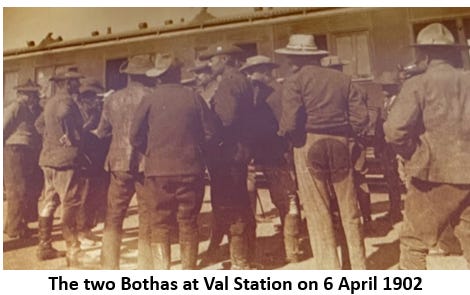
Chris Botha stands at the center, wearing a hat with a bright badge, while Commandant-General Louis Botha is positioned slightly ahead of him. The Treaty of Vereeniging was signed on May 1, 1902 and ended the war. About this time, the town’s name officially changed from Waterval to Val.
Once a year, Val is flooded by hundreds of visitors for Boer and Brit Day on April 15, where parades, reenactments and wreath laying take place. Val’s global connections continued into the 20th century. In 1913, Mahatma Gandhi was arrested there during his march from Natal to Transvaal, part of his civil disobedience campaign.

Val began to fall into decline in the 1970s. The railway station closed, the hotel crumbled, and as the people moved to cities, the hamlet seemed destined to disappear.
In 1994, the derelict Val Hotel went up for auction, attracting the attention of André and Rita Britz, who had married in the village church in 1982. For Rita, it was personal. Her family had farmed in and around Val since 1886. “I grew up close by. I came to this shop every Sunday to get the paper,” Rita said. “My grandfather got his hair cut on his wedding day in the barber shop that is now room 8.” “I was a teacher in Standerton at the time,” she said, “but I knew we needed this place. It’s too special to let go.”
Though it was derelict, they bought the hotel for R18,000, or around R100,000 in today’s value. “We didn’t have the money for that, but we had to,” joked Rita. With a knack for restoration, they and their two daughters moved in mid-1995 and welcomed their first guest in August 1995. In 2004, they bought the old general store and transformed it into a restaurant, bar and museum. It is frequented by people from all walks of life, from hikers to bikers to those just wanting to escape city life.
It also boasts events, including weddings, celebrations, and functions. The town’s residents work in the hotel, bar, or restaurant. “We have a 100% employment rate in Val,” Rina jokes.

Smith Street, one of three roads into Val, neatly divides the hamlet. On one side is the Val Hotel, museum, restaurant, pub, church and cemetery. On the opposite side is the former post office, the old railway station, and sports fields. Val has an unusual claim to security. At the end of Smith Street stands a regional police station with 28 officers!
From time to time, the distant rumble of freight trains echoes through the village, a reminder that the old railway still breathes life into Val. Rita, who jokingly calls herself a “glorified hoarder,” has shaped Val into a space where history lingers. Her influence is clear, mixing the past with a welcoming modern feel. The examples are seemingly endless, from bar counters repurposed from the old post office, to signs from years gone by.
One example is wooden panels, salvaged from a demolished farm school, now line the restaurant walls, one holding a photo of Rita’s grandfather outside the school. Visitors are often drawn into the stillness of the town. A memorial garden for fallen British soldiers leads to the quaint St Francis of Assisi chapel with its thatched roof and stained glass.
Asked what attracts people here, Rita shrugs and smiles: “There’s lots to see, but nothing to do.” For many, that’s exactly the charm. [All photos by Seth Thorne]
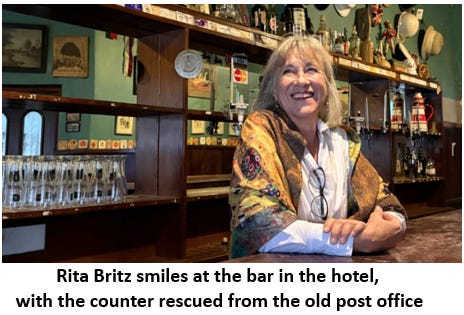



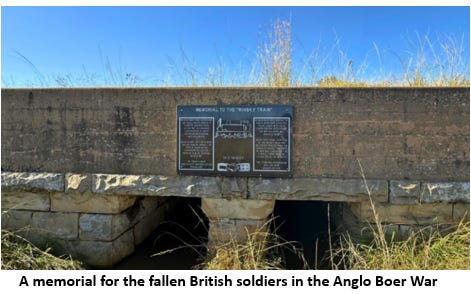
SOUTH AFRICA’S MILITARY STRENGTH Versus THE WORLD IN 2025 – [Direct extracts from |Businesstech.co.za]

South Africa is ranked as having the 40th military strength globally, falling seven points from 2024. The country also fell in the ranking of strongest military force in Africa, sliding by one point from third in 2024 to fourth in 2025. This places the country on the African continent behind Egypt (1st), Algeria (2nd), and Nigeria (3rd).
The ranking shows South Africa has 71,235 active and 29,350 reserve personnel. It also estimates that the country has around 14,989,776 citizens who would be fit for service should it enforce conscription laws. Notably, South Africa stands out for its land power but has fallen behind other nations in terms of air and naval power in recent years. The defence budget is estimated at $2.3 billion.
Airpower – South Africa has a total aircraft strength of 182 assets, this includes:
- 2 fighter aircraft
- 12 transport aircraft
- 81 trainer aircraft
- 97 helicopters (of which 10 are attack helicopters)
Army/Land power
- 252 combat tanks
- 18,692 armoured fighting vehicles
- 49 self-propelled artillery
- 134 towed artillery
- 101 rocket projectors
Naval power – South Africa has a total naval strength of 49 assets. Notably, the country has no aircraft carriers, destroyers, or corvette-class ships:
- 4 frigates
- 3 submarines
- 33 patrol vessels
- 2 mine warfare vessels
- 7 unspecified
The Global Firepower formula allows smaller, more technologically advanced nations to compete with larger, less-developed powers, and special modifiers, in the form of bonuses and penalties, which are applied to refine the list further, which is compiled annually.
One special modifier is a nation’s access to nuclear weapons, and while they are not recognised directly, these nations receive an indirect score bonus. However, some categories directly influencing the rankings include geographical factors, logistical flexibility, natural resources and local industry, among others.
In the 2025 ranking, the most powerful military forces have not changed significantly, with the United States still ranked as having the world’s strongest military power. The only major change among the top 10, when compared to last year, is France which is now ranked seventh, placing Japan into eighth. Other changes include Turkiye dropping one place to ninth and moving Pakistan out of the top 10 in 2025.
Russia remains the second strongest military force, followed by China and India in third and fourth place, respectively. Italy also remained in 10th place. The US military budget, at $895bn, is bigger than the remaining top 10 combined ($835.6 billion). While the US doesn’t have the largest front line or the largest fleet of tanks, its massive military budget puts it far ahead of the rest in the rankings.
Top 10 military spenders (Defence Budget)
- US: $895 billion
- China: $267 billion
- Russia: $126 billion
- India: $75 billion
- Saudi Arabia: $74.7 billion
- UK: $71.5 billion
- Japan: $57 billion
- Australia: $55.7 billion
- France: $55 billion
- Ukraine: $53.7 billion
The USA has the largest air force among the top 10 global military powers, and China has the most troops and naval vessels.
NEWS FLASH – SA farmers haven’t been this optimistic in years no matter what Trump says. BUT why are some fleeing to USA?
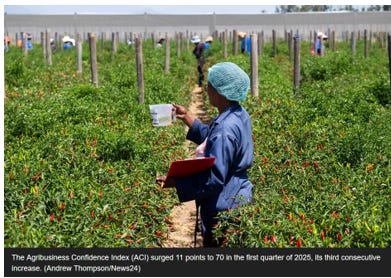
- The mood among agricultural businesses is currently the most optimistic it has been in 14 quarters.
- An agribusiness confidence index has surged in the first quarter, recording much stronger optimism about profitability and exports.
- This is despite the potential loss of AGOA.
US officials welcomed the first group of white South African ‘Afrikaner refugees’ to the United States recently. A total of 59 individuals, primarily families with children, arrived at Dulles International Airport near Washington, D.C., under a new refugee program established by an executive order signed in February. President Donald Trump is following through on his promise to extend a hand to one of the world’s most persecuted yet ignored minority groups; white Afrikaners, primarily farmers.
First Wave of White Afrikaner Refugees Arrived in USA Under the Trump Program. No Gang Ties, Just Patriotic Families Fleeing Persecution, Waving American Flags! https://www.thegatewaypundit.com/2025/05/first-wave-white-afrikaner-refugees-arrives-u-s/?utm_source=substack&utm_medium=email
Despite the potential loss of the African Growth and Opportunity Act (AGOA) trade agreement, and US President Donald Trump’s insistence that local farmers should move to the US as South Africa is a “bad place to be right now”, the mood among agricultural businesses is currently at its most optimistic since 2021. READ | Trump lies again about SA farms being taken, offers long-time farmers refugee status More farm murder victims are African, Police Minister said https://www.sanews.gov.za/south-africa/more-farm-murder-victims-are-african-police-minister
THE AGRIBUSINESS CONFIDENCE INDEX, compiled by the Agricultural Business Chamber of South Africa (Agbiz) and Industrial Development Corporation, surged by 11 points to 70 points in the first quarter of this year, its third consecutive increase and the highest level since the fourth quarter of 2021. The index surveys agricultural businesses on various factors, including exports, turnover, capital investments, profits, financing costs, employment, and bad debts.

The Agbiz-IDC Agribusiness Confidence Index also showed that farmers were upbeat about capital investments in the first quarter, which was already reflected in strong tractor and combine harvester sales. READ | SA farm exports reach record high Source
- The category for net operating income, an indicator of how profitable farmers are, surged by 28 points to 70 points, the highest level since the end of 2022. https://www.news24.com/fin24/economy/sa-farmers-havent-been-this-optimistic-in-years-no-matter-what-trump-says-20250317?lid=sw9ohpqilni2
A LESSON FROM A FELLOW AFRICAN STATE: Burkina Faso Gains International Recognition for its Revolutionary Stance Against Imperialism

Traore’s speeches and interviews are often quoted for their fierce denunciation of imperialism and 21st century neo-colonialism. The withdrawal of Burkina Faso along with Mali and Niger from the western-backed Economic Community of West African States (ECOWAS) has provided incentives for other political parties and mass organisations to think about the necessity to build a genuinely independent existence outside the framework of French and United States’ spheres of influence.
Demonstrations were held in other African states and cities around the world including Dakar, Lagos, Accra, Nairobi, and Johannesburg as well as in Paris, New York, and London. Traore is admired among youth, workers, and farmers in Africa and the Diaspora Source
- A day of Pan-African solidarity and the visit to Moscow for the VE 80th anniversary raises the level of awareness of the development process now unfolding in the Sahel region of West Africa https://www.globalresearch.ca/burkina-faso-gains-international-recognition-revolutionary-stance-imperialism/5887045
REVOLUTION FROM THE SOIL: Anti-Imperialism and Food Sovereignty in Burkina Faso

French colonial rule, however, upended these systems. Colonial administrators and missionaries imposed new crops and farming methods, often prioritising exports and the needs of colonial urban centres over local food needs. Source
- The colonial legacy was not simply one of resource extraction but of profound social and ecological transformation — a legacy that continues to shape Burkina Faso’s food system today. https://off-guardian.org/2025/05/06/revolution-from-the-soil-anti-imperialism-and-food-sovereignty-in-burkina-faso/
STOP PRESS – Last week President Donald Trump took his Oval Office theatrics to a new level

Much of what was shown by Trump as ‘evidence’ was quickly debunked by numerous US and international news outlets, but this bizarre publicity stunt revealed a disturbing trend of convoluted and baseless “white nationalist” conspiracy theories being integrated into actual US foreign policy, with the aim of maligning and defaming certain governments for various reasons. Source
- Cyril Ramaphosa of South Africa. Trump and his team hijacked the meeting by publicly declaring that Ramaphosa was guilty of presiding over an alleged “white genocide” in South Africa. https://21stcenturywire.com/2025/05/22/trump-white-south-african-genocide-from-fake-news-to-orchestrated-propaganda/
THOUGHT FOR THE WEEK – BRICS Nations Pushing Forward With Alternative Global Payment System – BUT CAN THEY DO IT?
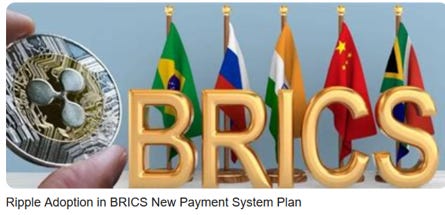
Russia has been pushing particularly hard for the BRICS bloc to consider an alternative payment network to replace the dollar-denominated SWIFT system. It’s an ambitious plan, easier said than done. After the BRICS summit in Kazan, Russian President Vladimir Putin conceded that there was no immediate plan, saying the economic bloc “have not and are not” creating such a system. However, it appears that BRICS has pushed forward with plans anyway and is making headway. Source
- All about the BRICS economy https://brics-pay.com/###
BREAKING SOUTH AFRICAN NEWS:
SA BUDGET 2025 (DELAYED) – CABINET APPROVES THIRD VERSION OF NATIONAL BUDGET

- Five important takeaways from Budget 3.0
SOUTH AFRICA’S PRESIDENCY OF THE GROUP OF 20 (G20) is a “defining moment” not only for the country but for the entire African continent. This is according to Tourism Minister Patricia de Lille, who was delivering remarks during the opening of the second G20 Tourism Working Group (TWG) meeting held in Durban, KwaZulu-Natal. https://www.sanews.gov.za/south-africa/g20-presidency-africa-ready
SURVIVAL MONITOR – Agriculture doesn’t work in silos

ZIMBABWE BEGS EVICTED WHITE FARMERS TO RETURN AS THE COUNTRY PLUNGES INTO FAMINE

“More than 60% of the population of a country, once seen as the breadbasket of Africa, is now considered food insecure, with most households unable to obtain enough food to meet basic needs due to hyperinflation,” said Elver. How did the “breadbasket of Africa” arrive at the point of “manmade starvation“? News24 reports that Mugabe and his Zanu-PF party began the controversial land reforms in 2000, forcibly seizing white-owned farms to resettle landless blacks. Mugabe said the reforms were meant to correct colonial land ownership imbalances.
At least 4,000 white commercial farmers were arrested and forcibly evicted from their land and their farms were confiscated by the government. The land seizures were often violent, claiming the lives of several white ffarmers during clashes with veterans of Zimbabwe’s 1970s liberation struggle. Critics of the reforms have blamed the land seizures for low production on the farms as the majority of the beneficiaries lacked the means and skills to work the land.
The Zimbabwean government’s message to exiled white farmers is now clear: Come back to Zimbabwe and save us. The nation is offering land leases to white commercial farmers in an effort to re-start the nation’s agricultural industry. Basil Nyabadza from Zimbabwe’s Agricultural and Rural and Development Authority says Zimbabwean farmers exiled in foreign lands should return to “home” soil.
In 2018, plagued by poverty, the Zimbabwean government began offering 99-year leases to white farmers, a deal previously reserved for black Zimbabweans. The resignation of president Robert Mugabe in 2017 and the swearing in of his successor Emmerson Mnangagwa bought significant change, with government officials finally admiting the campaign of land grabs that began in 2000 was a failure.
“Clearly, the formulas deployed then, left a lot of bad feeling. And more importantly, the intellectual property, left our borders,” Mr Nyabadza said. Without its professional, experienced farmers, Zimbabwe went from being an agricultural export powerhouse to having to rely on handouts from the United Nations’ World Food Programme. Hyperinflation and a multi-decade depression followed. History repeats if not rhymes. [Ed Perhaps the GNU should note recent history.]
The news comes as South Africa threatens to follow in Zimbabwe’s doomed footsteps in seizing white farmers land and exiling them from the country. South Africa maybe teetering on the brink of a race war after President Cyril Ramaphosa called on parliament to pass a law allowing white-owned land to be “confiscated” by blacks without any form of compensation.
Ramaphosa called white land ownership the “original sin”, and stated that he wants to see “the return of the land to the people from whom it was taken, to heal the divisions of the past.” How does he plan on doing that?
IN RESPONSE – A group of Afrikaners have sought asylum in America, citing claims of racial persecution. Deputy President Paul Mashatile has pleaded with farmers at the NAMPO Harvest Day 2025 not to leave South Africa for the United States, promising to address their concerns, including safety and crime. ”Well, the farmers that we met here today are saying that they are happy to stay in South Africa and all they need is for us to work with them to address the challenges they face,” Mashatile said. He made the remarks while speaking with the media on the sidelines of the NAMPO Harvest Day. The event is held at NAMPO Park in the Free State, which began on May 13.
Forcible confiscation. Specifically, confiscation without compensation. “The expropriation of land without compensation is envisaged as one of the measures that we will use to accelerate redistribution of land to black South Africans.” Ramaphosa did not mince his words. He’s talking about seizing land from white farmers and giving it to black South Africans, just like in neighboring Zimbabwe. Astonishingly, Ramaphosa followed up that statement by saying, “We will handle it in a way that is not going to damage our economy. . .” If South Africa refuses to learn the lessons of history, it is doomed to repeat them. Source
- Trump snipes South Africa ahead of Ramaphosa’s visit https://businesstech.co.za/news/government/824487/trump-snipes-south-africa-ahead-of-ramaphosas-visit/?utm_source=everlytic&utm_medium=newsletter&utm_campaign=businesstech
BUT UK is no different! The UK Civil Contingencies Act 2004 is a Hidden Weapon for Control. How the UK’s Emergency Powers Could Crush Freedoms in a Fabricated Crisis. And in UK there is no written constitution to protect the people, except the monarch, but he’s an absent clown anyway:
SMALLHOLDER FARMER PROGRAMME EMPOWERS 100 FARMERS
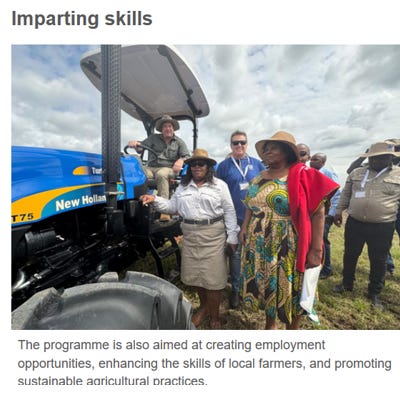
“I’m happy that Unilever is assisting us by providing access to marketplaces to sell our produce, helping to prevent financial losses. I encourage young people and women to join such programmes to learn about farming, which can be a viable source of income,” Jozini smallholder farmer, Zinhle Manzini said. The farmers also received a tractor while there was also an unveiling of a drying tunnel, symbolising the support and resources for the farmers. Agriculture Minister John Steenhuisen emphasised the importance of collaboration to address the challenges faced by the country.
WATER CONFLICTS RISING AROUND THE WORLD, ACCORDING TO DATA FROM THE PACIFIC INSTITUTE.


The first is termed “casualty” and describes the loss of water resources or systems due to becoming intentional or incidental targets of violence.
The second is defined as a “weapon”, where water resources or systems are used as an instrument or weapon in a violent conflict.
The third and final group falls under “trigger”, which covers conflicts that are directly over the control of water. In this case, economic or physical access to water, or the event of water scarcity, have triggered violence.
As the above chart clearly illustrates, the frequency of water conflicts is growing exponentially.
INFLATION – Miniscule increase for April

Good News: “The South African Reserve Bank’s (SARB) Monetary Policy Committee (MPC) has decided to reduce the repo rate by 25 basis points, with effect from 30 May. This reduces the prime lending rate from banks to 10.75 %.” https://www.sanews.gov.za/south-africa/reserve-bank-cuts-repo-rate-25-basis-points-0
NARRATIVE BATTLE – “In many ways, this is a moment that I believe is filled with great promise and endless opportunities for infrastructure development in our country.” [President Cyril Ramaphosa]

- Infrastructure development “fundamental” for SA’s growth https://www.sanews.gov.za/south-africa/infrastructure-development-fundamental-sas-growth
COMING NEXT:
- BOOM’s Weekly Global Review Sunday, June 1, 2025 (Now on BOOM’s (Substack)
- The Financial Jigsaw Part 2 (47) – RULING ELITE – Saturday, June 7, 2025
REFERENCES
- My Book: “The Financial Jigsaw” Parts 1 & 2 Scroll: https://www.researchgate.net/publication/358117070_THE_FINANCIAL_JIGSAW_-_PART_1_-_4th_Edition_2020 including regular updates.
- BOOM Finance and Economics Substack (Subscribe for Free) – also on LinkedIn and WordPress. Plus Covid Medical News Network CMN News and BOOM Blog — All Editorials (over 5 years) — BOOM Finance and Economics | Designed for Critical Thinkers — UPDATED WEEKLY (wordpress.com)

Click this link for the original source of this article.
Author: Austrian Peter
This content is courtesy of, and owned and copyrighted by, https://www.theburningplatform.com and its author. This content is made available by use of the public RSS feed offered by the host site and is used for educational purposes only. If you are the author or represent the host site and would like this content removed now and in the future, please contact USSANews.com using the email address in the Contact page found in the website menu.









